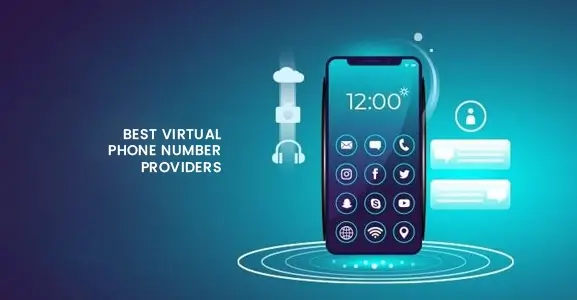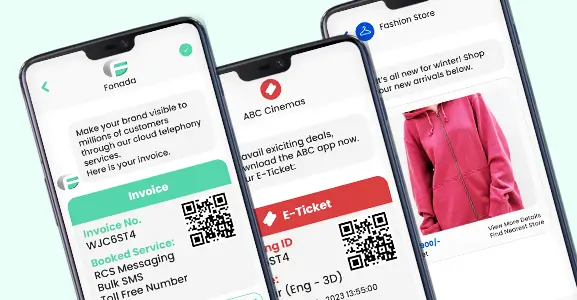Virtual telephone numbers mean that a telephone number is not linked to a definite phone line. Unlike traditional landlines, they are not plugged into a physical phone jack. They are connected to the internet from a computer or a smartphone, using Voice over Internet Protocol (VoIP) to make or receive calls.
One of the key factors for the growing number of virtual phone numbers is their flexibility of use. They offer remote accessibility, which means geographical location doesn’t matter to operate these numbers as long as you are connected to the internet because you can access them anywhere. Thus, they are ideal for businesses with a global outreach or teams working from far away. Another advantage of virtual numbers is that they can be set up at any time and with minimal effort. This allows companies to expand their communication solutions at a rapid speed.
In this blog, let us go through all the features and functions of virtual phone numbers, which benefit businesses irrespective of their size. Also, we will discuss how virtual numbers can be used as an effective and advanced communication tool for businesses to improve communication and efficiency.
Read More: How To Get A Temporary Phone Number? (What Is It, How It Works?)
So, without further delay, let’s begin.
What Is A Virtual Number?
Virtual phone numbers are similar to regular phone numbers, but they are not connected to a specific area or locations. They can be used to make or receive calls on any device, such as traditional cellular devices, VoIP phones or Softphones. These numbers are vital for businesses across the globe. They are the means for corporate companies to reach customers anywhere globally. Virtual phone numbers are the same as regular phone numbers in thier functionality and allow users to go beyond the reach of regular phone numbers.
How Does The Virtual Phone Number Work?
Virtual phone numbers are operational without the need for a physical SIM card or conventional telephony lines. On the contrary, they use the VOIP (Voice over Internet Protocol) technology to receive calls. When you dial a virtual number to make a call, you call a number that uses Internet communication protocols to re-route the call to the desired phone line or number.
The entire calling process is done over the Internet without using the phone network infrastructure. Besides, as a bonus, calls can be redirected to another laptop or mobile device just as quickly. This attribute distinguishes virtual phone numbers from traditional phone lines that ensure uninterrupted communication.
The technology has become a global phenomenon with the facilitation of calling and sending texts via platforms such as WhatsApp, Google Voice, or Messaging. These numbers originated in the cloud and can be easily integrated with pre-existing telephone numbers that you already own. The functionality of these numbers comes under the architecture called cloud telephony.
Traditional phone numbers have limitations. For example, when it comes to landlines or cell phones, you’re usually tied to a specific location to make or receive calls. Unlike smartphones that offer portability, you need to make sure you always remain accessible. Virtual phone numbers remove entirely these restrictions. No matter you’re traveling or working from home, you don’t have to be limited to a particular place or device to stay connected.
Learn More: What Is Internet Communication & How Can We Communicate Over The Internet?
How Can I Get A Virtual Phone Number?
Virtual phone numbers outweigh the benefits of traditional landline numbers. They are handy for small businesses and large organizations that process large volumes. If you are one of those individuals thinking about getting a virtual phone number for your organization, it is crucial to get familiar with cloud telephony numbers and how they can address your particular needs.
We Can Classify Virtual Phone Numbers Into Three Types.
- Virtual Local Phone Numbers
- Toll Free Numbers
- Vanity Numbers
Virtual Local Phone Numbers
The local virtual numbers, commonly referred to as the rate centers or area codes, are assigned to particular geographical locations.
For example, a business in New York can use a virtual local number with the area code 212 in order to give the impression of having a local presence in the city.
Toll-Free Numbers
Toll free numbers enable people to place calls free of charge. Businesses use these numbers, the ones that are recognizable by patterns, such as starting with 866, 800, or 888, to provide free calling services to customers. For example, a customer service hotline could use a toll-free number for easy accessibility.
Vanity Phone Numbers
Vanity phone numbers are associated with some unique digits that are exclusive, humorous, and simple to recall for humans.
For instance, a car dealer might use a vanity number 1-800-CARS4YOU to make the contact info easier to remember for customers.
Prime Difference Between Virtual And Regular Phone Numbers?
Virtual and regular phone numbers share several similarities; however, there are key differences that set them apart. Here are the prime distinctions between the two:
| FEATURE | VIRTUAL PHONE NUMBERS | REGULAR PHONE NUMBERS |
|---|---|---|
| Ownership | Not tied to a physical phone line | Require a physical phone line |
| Location | Can be assigned to any geographical location | Tied to a specific geographical location |
| Flexibility | Can be easily moved or changed | Generally fixed and cannot be changed easily |
| Features | Offer advanced features like call forwarding, IVR, etc. | Typically offer basic calling and voicemail features |
| Cost | Often more cost-effective, especially for businesses | Costs may vary based on usage and provider |
| Scalability | Easily scalable to accommodate business growth | Limited scalability without additional infrastructure |
| Accessibility | Can be accessed remotely with active internet connection | Require physical access to the phone line |
Major Benefits Of Using A Virtual Number For Business
There are several advantages of a virtual phone number for your business. Some of them are listed below.
Cost Efficient
Virtual phone systems allow people to call each other without paying expensive calling charges across the world. You can offer your callers a free toll number, which they can call without incurring any cost.
For instance, if you are promoting your product in the UK by means of a marketing campaign, giving a toll-free number will help you be in touch with the customers and build their trust.
Expanded Client Base
Through virtual numbers, companies are able to broaden their customer base and assist them in numerous ways. With the use of Direct Inward Dialing (DID), a customer can simply reach the particular person or department they need, for instance, the sales or tech team, which greatly improves their experience.
Auto Attendant Feature
Most cloud phone service providers, like Fonada, offer auto attendant services as a standard feature. With this feature, callers are welcomed with greetings and directed to the correct person or department, making the experience efficient.
For instance, if the caller needs help with a billing issue, their call can automatically be routed to the finance expert.
Privacy And Peace Of Mind
Virtual numbers will let you call without revealing your actual identity. This is highly beneficial and important for remote workers because they can manage their working hours and take calls or pass them on to voicemail without compromising their privacy.
Scalability
Eventually, handling business calls with your personal contact number will start becoming inconvenient and may not be scalable as your business scales up. The virtual phone number offers the organization a unique contact number for the management of incoming and outgoing calls as the company grows.
Global Communication
Virtual phone numbers can be used globally, making it easier to communicate with customers in different countries. This benefits businesses that function internationally or plan to expand their reach.
Convenience And Flexibility
Virtual phone numbers offer convenience and flexibility, allowing you to manage your calls from anywhere. Whether you’re in the office, at home, or on the go, you can easily get in touch and connect with your customers.
Read More: How To Set Up A Virtual Number For WhatsApp Business?
How To Choose The Best Virtual Phone Number Provider
A virtual Indian number serves as a way of distinguishing between business and personal calls received via mobile device or landline. This is done by getting a unique number that can be accessed on the same devices as a regular number. Moreover, users can access different features such as voicemail, management of multiple lines, and call routing. Thus, selecting an affordable, user-friendly, and reputable provider is paramount.
Price: Compare all the pricing structures with other providers available in the market and check what uniqueness you are getting with your service provider
Convenience and Installation: Ensure your service provider has solutions that can be set up with your current system and support easy installation without additional costs.
Call Management: Check if your service provider offers essential call management features like call forwarding, screening and blocking.
Extensions: Test the capability of each virtual number to forward incoming calls.
Multi-line Capability: Make sure the provider allows for separating personal and business calls on both fixed-line and mobile phones.
Sound Quality: Review the quality and clarity of virtual calls according to online reviews.
Automated Attendant: Look for providers that offer computer-based attendants for routing incoming calls based on call details.
Customer Support: Grade the providers based on the response time and consistency in the customer service.
Top 10 Virtual Phone Number Providers For 2024
Here’s a list of the top 10 virtual phone number providers:
1. Fonada
Fonada, one of the leading virtual phone number providers in India, offers comprehensive customer engagement solutions that enhance communication, increase sales, and reduce costs for all types of organizations. Its all-in-one communications platform supports video and audio communication, faxing, and instant messaging, making it easy to use and navigate.
Core Features
- Smart Call Routing
- Call Recordings for Future Reference
- Call Forwarding
- Agents Can Attend Unlimited Parallel Calls
- Multi-lingual Support
Pros
- Low CPU Usage
- Compatible with Windows and Other Platforms
- Limited Quantity of License Applications
Pricing
- Basic: Free
- Custom Plans Available
2. Grasshopper
Grasshopper provides virtual mobile numbers to help separate professional and personal contacts on your phone. With a low starting price, users get unlimited calls and texts, call forwarding, and access to an automated attendant. Ideal for remote workers, it offers WiFi calling and voicemail transcription, accessible from desktops and mobile devices.
Core Features
- Call Recording and Forwarding
- Voice-Recognition Technology
- Ring Groups
- Personnel Directory
- VoIP
Pros
- Excellent Features for Texting
- Customized Greetings
Cons
- Call Setup Can Be Complicated
Pricing
- Starts at $26 per month
3. RingCentral
RingCentral is an all-in-one communication network with a clear user interface. Compatible with all devices, it allows for easy setup and operation, enabling unique greetings, call forwarding, and call management features to ensure you never miss a call.
Core Features
- Call Monitoring
- Automatic Voicemail Transcriptions
- Statistical Reporting and Analysis
- SMS and MMS
- Fax Service
Pros
- Harmonic Integration
- Rich Dashboard
Cons
- Ways to Improve Call Groups
Pricing
- Essentials: $19.99 per month per user
- Standard: $27 per month per user
- Premium: $34.99 per month per user
- Ultimate: $49.99 per month per user
4. CallHippo
CallHippo offers virtual mobile numbers in India that can be activated within three minutes. It provides power dialing, call analysis, call transfer, and call forwarding, focusing on customer service and agent productivity to improve agent-client communication.
Core Features
- Powerful Dialer
- Smart Switch
- Smart Call Forwarding
- Call Transfer
- Call Conference
Pros
- User-Friendly, Scalable, and Secure
- Harmonic Integration
Cons
- Lacks Mail Drop and SMS Sequences
- No Free Trial Period
Pricing
- Bronze: $16 per month per user
- Silver: $24 per month per user
- Platinum: $40 per month per user
5. 8×8
8×8 provides cloud telephony for small and medium-sized organizations, offering HD-voice calling and customer service to interact with customers more efficiently. It aims to streamline workplace communication with virtual business numbers, unlimited nationwide calling, and video conferencing.
Core Features
- Auto-Attendant
- Intelligent Routing of Phone Calls
- Video and Audio for Business Meetings
- Management Analytics
- Monitoring and Barging Calls
- Innovative Reporting and Analytics
Pros
- On Hold Music
- Integration and Fax Services
Pricing
- 8×8 Express: $12 per user per month
- X2: $24 per user per month
- X4: $44 per user per month
6. Nextiva
Nextiva provides sophisticated communication services for both small and large businesses, offering instant messaging, phone calls, and video conferences with one click. It saves time with AI and automation, providing customer assistance across multiple channels.
Core Features
- Quick Auto-Attendant
- Real-Time Conversation
- Unlimited HD Voice Calls
- Simple Voicemail Transfers to Emails
- Call Routing
Pros
- Superior Quality Service
- Scalable and Adaptable
Cons
- Poor Call Quality
Pricing
- Plan A: $19.95 per month
- Professional: $20.95 per month
- Enterprise Plan: $27.95 per month
7. Vonage
Vonage assists businesses in improving customer service with its unified communication solution, facilitating collaboration and increasing work productivity. It offers a reliable phone queue system for call centers to manage call queues effectively.
Core Features
- Audio/Video Conference
- Call Monitoring
- Recording and Routing Calls
- Call Centre Management
- IVR/Voice Control
Pros
- Simple and Robust Interface
- Reliable Customer Support
Cons
- Expensive
Pricing
- Mobile: USD 19.99 per month per line
- Premium: $29.99 per month per line
- Advance: USD 39.99 per month per line
8. Genesys
Genesys provides call center solutions with AI-powered predictive routing for tailored support. It is one of the leading virtual number service providers. It helps businesses by offering advanced customer engagement solutions to handle call center challenges. Its dashboard offers activity tracking, alerts, real-time chatting, reporting, and analytics.
Core Features
- Dashboard of Activities
- Alerts/Escalation
- Real-Time Chatting
- Reporting & Analytics
- Tracking of Interactions
Pros
- Harmonic Integration
- Reliable Assistance
Cons
- User Interface Could Be Improved
Pricing
- Based on Client’s Specifications
9. Zadarma
Zadarma offers a corporate phone solution with a user-friendly interface and 14 years of experience. Its cloud PBX can be quickly configured to meet unique corporate needs, supporting phone pickup, recording, forwarding, transferring, and waiting.
Core Features
- Multichannel Customer Service
- Integrated CRM System
- Call Logging and Tracking
- Auto-Dialer
- Contact Management
Pros
- Integrating Third-party
- 24/7 Customer Support
Cons
- Problem with Spam Calls
Pricing
- Based on Customer Requirements
10. Aircall
Aircall provides skill-based call routing and real-time call monitoring for businesses. Its extensive features help call centers run smoothly, with PowerDialer and real-time mentoring to complete deals quickly and effectively.
Core Features
- Click-to-Dial
- Call Centre IVR Menus
- Voice Message
- Blocklist Numbers
- Virtual Call Centers
Pros
- Customized Three-Digit Extension Number
- International and Toll-Free Phone Numbers
Cons
- Lack of Intuitive User Experience
Pricing
- $30/month for Essentials
- $50/month for Professional
- Custom Plans Available
Conclusion
In summary, traditional numbers have limitations that make them less suitable for business. In contrast, virtual numbers have no such constraints, offering efficient management of business communication and helping build brand image, improve customer experience, and revolutionize company performance. Virtual Indian numbers are cost-effective, simplify life, and are an investment worth making, allowing users to separate personal and professional communications effectively.
FAQs
A virtual number operates by directing the calls to a particular phone number which can be a landline, mobile, or VoIP one. It does away with the need for a physical telephone line in the place of receiving calls.
Virtual numbers offer a remote feature by making calls to be forwarded to any location or device so that users can be online even when they are not physically available at a certain place.
Virtual numbers are secure and trusted as they apply encryption and follow high-end security protocols to protect call data.
Virtual numbers generally are not free. These are offered by telecom service providers or virtual number providers at certain charges, which may differ depending on the provider and the features to be included in the package.
Yes, you can call abroad with your virtual phone number. Virtual numbers can be set up with international dialing capabilities, letting you make and take calls to and from international dialers.
Yes, you can easily port your current number to a virtual phone number provider most of the time. The process will differ depending on the provider and the type of number you are porting.
Virtual phone number services often include features of call forwarding, voicemail, call recording, IVR (Interactive Voice Response), virtual receptionists, etc. These features enable communication abilities for companies and customers who are using virtual numbers.
No, the virtual number provider offers services on certain pricing plans.
There are several online services that offer virtual Indian phone numbers for SMS. You can find them on websites or mobile apps that provide virtual phone number services. Some may require registration, and others may offer free or paid options with different features.
The legality of using virtual phone numbers in India for SMS depends on local regulations. Generally, using virtual numbers for legitimate purposes, such as online verification, is legal. However, engaging in fraudulent activities or unauthorized use may be against the law.

Dec 11, 2024
Top Contact Center Optimization Tools For 2024
“A thriving business knows how to fetch maximum output from limited resources by optimizing ca... Read More
Nov 13, 2024
What Is Brand Communication? CPaaS Role Explained
Did you ever wonder why some advertisements grab your attention instantly, while others do not? The... Read More
Nov 01, 2024
What Is Automated Messaging And How Does It Work?
Automated messaging or text automation empowers businesses and marketing professionals to connect wi... Read MoreLatest Updates
From Fonada
Industry Insights, Trends, Innovations, Updates, and Case Studies from Industry Experts
View
Customer
Reviews
Discover why our customers love us - read their authentic and heartfelt reviews!
View
Case
Studies
Explore real-life scenarios, offering analysis, and solutions to practical challenges
View
Convert Leads Into Sales With Fonada
Trusted CPaaS Solution Provider








